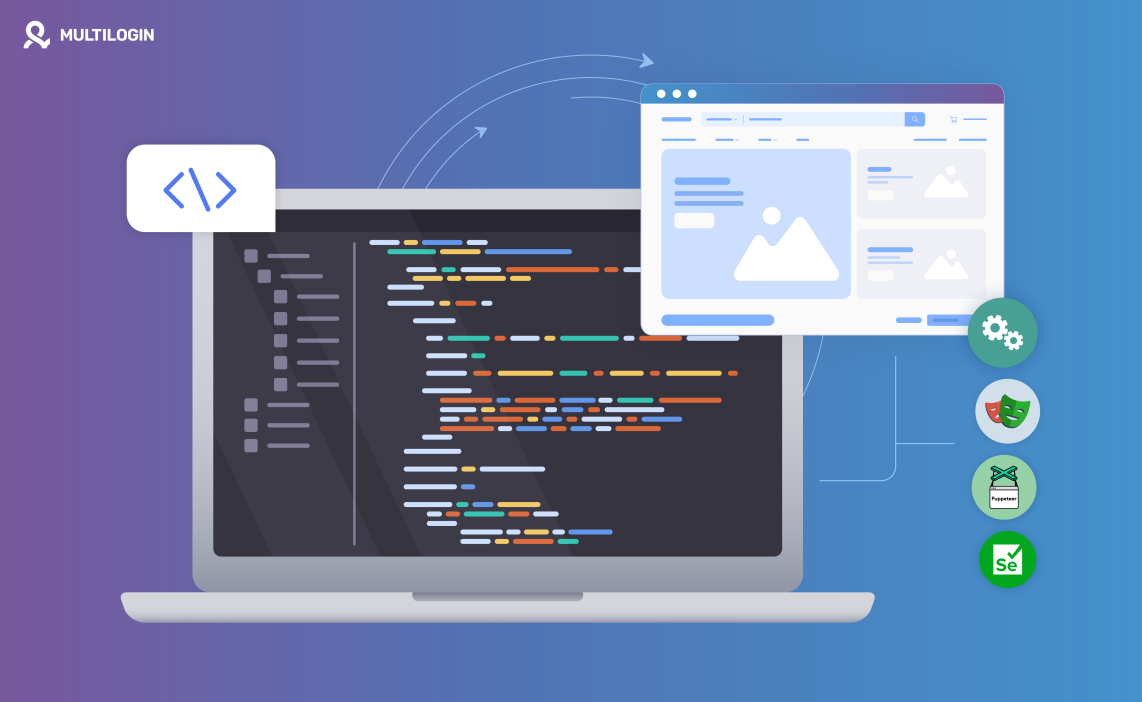Web scraping is an essential technique in today’s data-driven world. Whether you’re gathering product information, analyzing trends, or conducting market research, scraping can help you unlock vast amounts of data from websites.
Python stands out as the top programming language for web scraping, thanks to its simplicity, robust libraries, and extensive community support.
In this guide, we’ll explore the best Python web scraping tools for 2024 and how you can use them efficiently to extract data. We’ll also discuss how integrating Multilogin can enhance your scraping activities by offering anonymity and security to avoid detection and bans.
Why Python Is Perfect for Web Scraping
Python’s popularity for web scraping isn’t an accident. Its user-friendly syntax, coupled with a large selection of libraries, makes it an ideal choice for both beginners and professionals.
Key Benefits of Python for Web Scraping
Readable Syntax: Python’s clean, readable syntax makes it easier to learn and implement for complex scraping projects.
Powerful Libraries: Python has many libraries specifically designed for web scraping, offering everything from HTML parsing to browser automation.
Cross-Platform Compatibility: Whether you’re using Windows, macOS, or Linux, Python can handle it all, ensuring seamless execution on multiple platforms.
Top Python Web Scraping Tools in 2024
1. BeautifulSoup
BeautifulSoup is one of the most popular and beginner-friendly libraries for web scraping. It excels at parsing HTML and XML documents and provides powerful methods for navigating and searching through these documents.
Features
Ease of Use: Simple syntax makes it perfect for newcomers.
HTML Parsing: Converts complex HTML documents into navigable Python objects.
Integration: Works well with requests to fetch pages for scraping.
Best For: Beginners or those looking to scrape smaller websites with static content.
2. Scrapy
Scrapy is a full-fledged Python framework designed specifically for large-scale web scraping projects. It supports the crawling of multiple pages at once, making it a great option for more advanced users.
Features
Scalability: Capable of handling large datasets and multiple requests.
Customization: Lets you define specific rules for data extraction, response handling, and more.
Performance: Scrapy is fast and efficient, optimizing requests to ensure you get data quickly.
Best For: Large-scale, high-performance web scraping projects.
3. Selenium
Selenium is a powerful tool for scraping dynamic websites that rely heavily on JavaScript. It allows you to simulate user interactions like clicking, scrolling, and submitting forms.
Features
Browser Automation: Automates user actions like clicking, typing, and scrolling.
Handles Dynamic Content: Ideal for scraping websites where content is loaded dynamically via JavaScript.
Cross-Browser Compatibility: Works with major browsers such as Chrome, Firefox, and Safari.
Best For: Scraping websites with complex dynamic content, like e-commerce platforms or social media pages.
4. Lxml
Lxml is another high-performance library for parsing XML and HTML documents. It is known for its speed and efficiency, making it perfect for scraping large websites with high data volume.
Features
Fast Parsing: Known for its speed in parsing large volumes of data.
XPath Support: Allows advanced querying of HTML and XML documents.
Compatibility: Can work with BeautifulSoup for additional flexibility in parsing.
Best For: Projects that require speed and efficient parsing of large datasets.
5. PyQuery
PyQuery provides a jQuery-like syntax for querying HTML documents using Python. It simplifies data extraction and manipulation, making it great for those familiar with jQuery.
Features
jQuery-Like Syntax: Easy to use for developers who are already familiar with jQuery.
Data Extraction: Makes extracting specific elements from HTML straightforward.
Integration: Works smoothly with other Python libraries like requests.
Best For: Developers who prefer jQuery-like syntax and want to quickly extract specific data from HTML documents.
6. Requests-HTML
Requests-HTML is a high-level web scraping library that offers support for scraping JavaScript-heavy websites, making it a simpler alternative to Selenium for less complex dynamic content.
Features
JavaScript Rendering: Renders dynamic JavaScript content for scraping.
Simple API: A user-friendly API that simplifies complex scraping tasks.
Asynchronous Requests: Supports asynchronous web scraping to speed up the data extraction process.
Best For: Developers looking for a simpler tool to scrape both static and dynamic pages without the complexity of Selenium.
Multilogin: Enhancing Anonymity and Security for Scraping
While Python scraping tools are powerful, they come with inherent risks. Many websites, such as Amazon, Facebook, and LinkedIn, monitor for scraping activity and impose bans on IP addresses or accounts detected engaging in automated scraping. That’s where Multilogin comes into play.
Multilogin provides an antidetect browser solution, allowing you to create multiple browser profiles that look like entirely different users. This helps avoid detection and protects your scraping operations from bans and blocks.
How Multilogin Can Improve Your Web Scraping:
Unique Browser Fingerprints: Multilogin creates unique browser fingerprints for each profile, making it appear as though different devices and users are accessing the site.
Proxy Integration: Combine Multilogin with rotating proxies to further reduce the risk of detection by changing your IP address for each scraping session.
Session Isolation: Each browser profile runs independently, ensuring that cookies, history, and session data don’t get shared across profiles.
Scalability: Manage hundreds or thousands of profiles efficiently, perfect for scraping multiple pages simultaneously.
Best For: Scrapers who need to manage multiple accounts and avoid detection from websites with strict anti-scraping measures.
FAQs About Python Web Scraping
Is Python Best for Web Scraping?
Yes, Python is considered one of the best programming languages for web scraping due to its simple syntax, powerful libraries, and wide range of tools that cater to both beginners and experts.
Is Scrapy the Best Web Scraper?
Scrapy is one of the best choices for large-scale web scraping projects. It offers high efficiency, scalability, and flexibility, making it suitable for more advanced scraping needs.
How Much Python is Needed for Web Scraping?
Basic Python knowledge is sufficient to start using tools like BeautifulSoup and requests. However, for more complex projects using Scrapy or Selenium, a deeper understanding of Python is required.
Is BeautifulSoup Faster Than Selenium?
BeautifulSoup is faster for parsing static HTML pages. However, Selenium is better suited for scraping dynamic content that requires user interaction or JavaScript execution.
Is Web Scraping Better Than API?
Web scraping is often necessary when no API is available or when the API is restricted. However, APIs are generally preferred for data extraction as they are faster and more reliable.
Can I Use Django for Web Scraping?
Yes, Django can be used for web scraping projects by integrating it with libraries such as BeautifulSoup or Scrapy, though it’s typically better suited for web development than for scraping.
Should I Use JavaScript or Python for Web Scraping?
Python is generally preferred for web scraping due to its large ecosystem of scraping libraries. However, JavaScript is sometimes used for scraping JavaScript-heavy websites.
Conclusion
Python offers a comprehensive suite of tools for web scraping, from the simplicity of BeautifulSoup to the power and scalability of Scrapy. Each tool has its specific use case, and choosing the right one depends on the complexity and requirements of your project. Whether you’re scraping static pages or dynamically loaded content, Python has you covered.
For those concerned about detection and bans during large-scale scraping activities, integrating Multilogin into your workflow provides an additional layer of security. It enables you to manage multiple profiles and proxies, ensuring that your scraping operations remain undetected and efficient.



